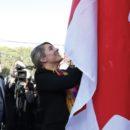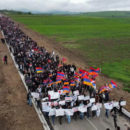Armenia – The heads of a European election-monitoring mission hold a news conference in Yerevan, 3Apr2017.
Elections well administered and fundamental freedoms generally respected, but tainted by credible information about vote-buying, pressuring
Election observers representing various pan-European organizations cited vote buying, intimidation of voters and other irregularities in their preliminary assessment of Armenia’s parliamentary elections presented on April 3, reports Azatutyun.am.
“Despite welcomed reforms of the legal framework and the introduction of new technologies to reduce the incidents of electoral irregularities, the elections were tainted by credible information about vote-buying, and pressure on civil servants and employees of private companies,” they said in a joint report. “This contributed to an overall lack of public confidence and trust in the elections.”
The nearly 300 observers mostly deployed by the Organization for Security and Cooperation in Europe monitored voting and ballot counting in polling stations across Armenia on Sunday. They also included representatives of the European Parliament and the parliamentary assemblies of the OSCE and the Council of Europe.
“It is a pity that despite all of the legal and organizational changes these elections did not remove long-standing doubts about the reliability and integrity of electoral processes in the country,” Liliane Maury Pasquier of the Council of Europe Parliamentary Assembly (PACE) told a joint news conference with other heads of the monitoring mission.
“Regrettably, the process was undermined by credible, recurring information of vote buying, intimidation of voters notably civil servants in schools and hospitals and employees of private companies as well as abuse of administrative positions,” agreed Heidi Hautala, who led the observers from the European Parliament.
The mission chiefs declined to say whether they think the irregularities were serious enough to affect the official vote results that gave a landslide victory to the ruling Republican Party of Armenia (HHK). “The election is not just what’s happening in polling stations on election day,” said Ignacio Sanchez Amor, the mission coordinator representing the OSCE.
Vote buying by the HHK is a key source of complaints voiced by Armenian opposition parties and local election observers. They claim that it was instrumental in the HHK’s victory.
Vote bribes are also a major highlight of the preliminary conclusions of the European monitors. “Widespread allegations of vote-buying to vote for certain parties were reported throughout the country and the OSCE/ODIHR [election observation mission] received many credible reports directly from the public,” reads their report. It says even some Armenian government officials acknowledged that “vote-buying had become an entrenched part of political culture” in the country.
The mission was careful, however, not to name any Armenian party engaged in bribing or intimidating voters. It said only that these illegal practices, also reported by the Armenian opposition, media and observers, called into question Armenians’ “ability to cast their votes free of fear of retribution.”
The report assesses negatively the voting process in 12 percent of polling stations visited by the European observers due to problems such as overcrowding and violation of the secrecy of the ballot. “In addition, large groups of people were present in the immediate vicinity of polling stations in 30 per cent of cases, with tension seen in 6 per cent of observations and intimidation of voters in 4.5 per cent of observations,” it says.
The report also offers a negative assessment of 20 of 118 vote counts attended by the observers mainly because of “undue interference in the process” by unnamed party proxies. Also, it says, election officials in over a dozen polling stations “did not determine the validity of ballots in a consistent and reasonable manner.”
On the positive side, the reports notes, among other things, that “fundamental freedoms” were generally respected during the election campaign and that Armenian state television provided “equitable coverage” of their pre-election activities.
The OSCE-led mission did not report significant instances of multiple voting, one of the most serious forms of fraud that marred previous elections. The Armenian authorities enacted last fall a set of opposition-backed legal amendments designed to preclude this illegal practice. This led to the introduction of electronic voter authentication devices in all polling stations across the country.
The authorities also installed web cameras to broadcast online voting and ballot counting in the vast majority of those stations. The European Union allocated earlier this year over $7 million for the purchase of the equipment.
“The use of new voting technologies cannot alone restore confidence in elections … just the same as better legislation is only effective if applied in good faith,” Pasquier, the top PACE monitor, stressed at the news conference.
A deputy chairman of the ruling HHK, Armen Ashotian, insisted late on Sunday that the elections were free and fair and marked a “leap forward” in Armenia’s democratization. The European observer report clearly does not back that claim.





